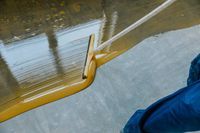Are you going to grind the floor? This is critical, this generates the proper profile or CSP which stands for the concrete surface profile. Without a profile epoxy products are unable to mechanically bond to the floor properly. This can lead to catastrophic failure which usually presents as bubbling, cracking or delaminating
How are you going to mitigate any oil or contaminate stains? Surface level stains should be removed during the grinding process. Deeper stains should be addressed with a hydrocarbon degrading product to essentially eat the oil, these products are similar to those used in oil spills at sea.
Are you going to use a moisture epoxy primer? This prevents moisture related issues like bubbling, cracking, fish eyes or delamination which will cause a complete failure of the floors integrity. In many cases the only way to repair the floor is to grind everything back to clean white concrete and start from the beginning.
Do you use a seperate epoxy over the primer? Primer should not be flaked into, if your doing a flake floor. Many companies do this, it's quick but it's the wrong process to use due to the weight of the flakes pushing down through the epoxy primer and touching the underlying concrete. This allows moisture, which is always present in concrete, more so if on grade to eventually push up through the primer and fail your floor. Take some time but it's going to happen.
What type of clear coat do you use? Water based clear coats typically will fail over time due to the heat generated from your vehicle tires, this is called hot tire pickup. There are very few water based products on the market that will prevent this but they are very rare and have to be specifically formulated at time of manufacture to prevent this. A high quality polyaspartic or polyurea clear coat is also a great option to prevent your floor from failure.
What is the temperature tolerance of the products that your using? Epoxies in general do not like temperatures under 50 degrees, this includes overnight temperatures as well. 24 hours of drying and cure time is generally ideal. If applied during colder temperatures the epoxy will never fully cure and will not perform the way it's designed. Thus will result in premature failure of the floor.
How long is my warranty? To put it into perspective I use epoxy products that carry a lifetime warranty against failure. I, in turn, offer a 10 year warranty on all work. Be wary of any warranties that are 1-3 years. If done the right way epoxy floors should last for much longer than a few years.

